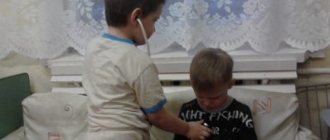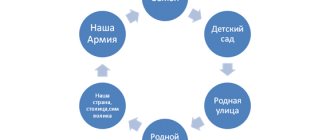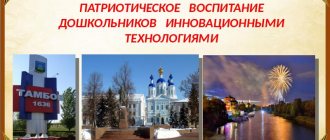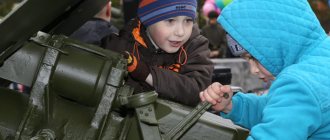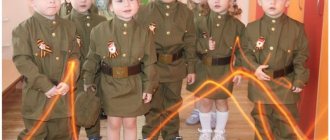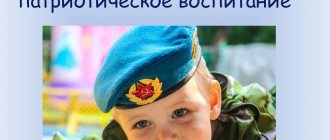Patriotic education within the family
Ulyana Kubrikova
Patriotic education within the family
Patriotic education , this idea has deep historical roots and foundations. For centuries in Russia, the main task of training and educating the younger generation was considered to be the formation of a “true son of the Fatherland”
,
a patriot based on the examples of the exploits of his ancestors.
We all know that patriotism is love for the Motherland . is brought up in children by preschool and school institutions, but first of all this should be done by parents. More attention needs to be paid to the development and education of patriotism in children, not only from the state, but also from the family , first of all.
The conditions of a preschool institution do not always allow for direct perception of social life . And this is where parents can come to the rescue. After all, it is in the family that children simply and naturally become familiar with life, in the family the foundations for a child’s understanding of the world are laid, and from the first years of life he learns moral values, social norms, and cultural traditions of society. “ The family is a unique social institution, as if by nature itself, intended for the purposes of education . It combines a fairly strong normative foundation with the possibility of subtle emotional interactions and long-term individual interaction.”
Where does patriotic education in the family ? Yes, in the words of the child, “Mom, what was here before?”
.
At this moment, the process of developing knowledge of history , including knowledge of one’s small homeland. Studying with your children the places where you live, loving to wander along familiar streets, knowing what they are famous for is a task that is quite within the reach of any family . Every walk can become a means of developing sublime feelings. Everything you can see, touch, everything that has stood for centuries. It can be exciting if presented correctly. And within a family it can be endlessly interesting and great.
History has a special charm for a child because it forces him to take root in the land for which his ancestors sacrificed their lives. To the child’s serious question, “How did my great-grandfather die?”
, it is impossible not to give an answer, since it is a direct path to
instilling a sense of patriotism in a son and daughter who continue the work of their parents and their ancestry.
Telling and showing children family heirlooms - memorable items associated with the combat life or military service of their fathers, grandfathers, and great-grandfathers. Behind each such item there is a family inheritance. This is where a family tradition begins. In these minutes and hours, children feel like a single whole, inseparable from their family . Knowledge of one's own roots, respect for one's history, spiritual values, and love for the city and country are passed on from generation to generation. Which is good for fostering true love for the Motherland, for Russian culture.
Do all parents talk to their children about the Motherland? Do all parents talk about her wealth and beauty, about devotion and service to her, about protecting her honor and glory? Some parents believe that it is unnecessary to talk about this the family “...they talk about it a lot in kindergarten and at school”
.
Therefore, for preschool teachers in moral and patriotic education , the main task is to attract parents to actively participate in the life of the group of their children.
The joint participation of children and parents in the preparation and conduct of events that form an idea of their attitude towards their small Motherland and Fatherland. Some events become traditional, finding a response in the hearts of not only children, but also their parents. Such events include:
• Joint excursions to city museums and places of military glory. Laying flowers at the steles in honor of the heroes of the Great Patriotic War. Meetings with veterans;
• Implementation of projects together with parents:
"My family "
(conversations, writing stories about your
family , wartime ancestors, holidays, exhibition “Generations”
);
"My city (town)
"(stories
from the teacher and parents about the history of the city, looking at photo albums, a tour of the city);
“Sights of the city (village)
»;
"Famous Countrymen"
(dramatization of fairy tales,
teacher about famous people - writers, artists);
Organization of a mini-museum in a group (wartime relics)
.
Helping parents and actively participating in the process of patriotic education of their children is necessary in the form of information for parents: travel books (what and how to tell children about the events of the Great Patriotic War)
.
There may also be stories from adults about wartime (battle episodes, streets - heroes, family routes to memorial places of fallen heroes - fellow countrymen, wall newspapers with photographs of children and parents at memorable places, a memo for parents "Famous people on nurturing love for the Motherland ."
Work on the formation of patriotic feelings is more effective if the preschool institution establishes a close connection with the family ... The need to include the family in the process of familiarizing preschoolers with the social environment is explained by the presence of pedagogical opportunities that create favorable conditions for the education of higher moral feelings: love and affection for children, emotional and moral intensity of relationships, their social, not egoistic orientation.The teacher, with the features mentioned above, correctly determines the place of family pedagogy in the general educational process .
It is necessary to reveal the essence and meaning of the work of parents and teachers. After all, these are the first steps on the path to patriotic education , to the introduction of Great History - through family . Parents are not only assistants to a child care institution, but equal participants in the formation of a child’s personality.
“In your family and under your leadership, a future citizen, a future activist and a future fighter is growing. Everything that happens in the country should come to children through your soul and your thought” (A. S. Makarenko)
.
Raising patriots today means ensuring the future, tomorrow. These are the goals and objectives that teachers and parents should set for themselves.
Patriotic education is work into which we must invest part of our soul, part of our heart, and pass it through ourselves.
Recommended reading
1. Krom, M. How old is patriotism ? [Text] / M. Krom // Motherland. – 1994. – No. 10 – pp. 15–21.
2. Dubrovina I.V. The World of Psychology. Family and child socialization. - 1998. - No. 1. - P. 54-57
3. Chechet V.V. Patriotic education in the family ? – M., 1989.
4. N. A. Arapova-Piskareva. « Educational system “Little Russians”
.
Program for moral and patriotic education of preschool children " - 2005.
5. Zhukovskaya R.I. et al. Native land: A manual for educators .
THE ROLE OF THE FAMILY IN THE FORMATION OF PATRIOTIC QUALITIES IN CHILDREN
The most favorable period for civic-patriotic education is considered to be primary school age (from 6-7 to 10 years). Since at this age a person’s adaptability is high, and he is less susceptible to the influence of external anxiety
[14].
Primary school age opens up great opportunities for consistent and systematic education, which also includes civic, patriotic, and moral education. The principles that are embedded in the character and worldview of a person at a given age have a strong, stable foundation. More advanced forms of raising children of this age can be conversations, memories of parents, short stories, looking at a family photo album, relics (awards, personal belongings, newspaper articles), as well as visiting museums and exhibitions; reading poems and works on military-patriotic themes. It is useful for the older and younger generations of the family to watch historical films and television programs about history, people, and heroes together; learn heroic and patriotic songs. Children need to be introduced to military symbols, namely banners, orders, medals, as well as honorary weapons and elements of military uniforms.
Parents can create situations that require the child to exert tension of will and consciousness, imagination, active work of feelings, memory, thinking and attention. For example, a child may perform certain household duties around the house and be responsible for providing self-care to family members in need. At family holidays, it is useful to have games in which all family members participate.
It is necessary to develop a child’s point of view about the usefulness of physical education and sports, develop the ability to carry out simple physical exercises and arouse interest in sports that develop strength, endurance and speed, as they are important for future preparation for work and defense of the Fatherland [2].
The forms of civic-patriotic education among adolescents generally remain the same, but they are improved, modified and complicated. The older the child becomes, the more parents need to pay attention to his requests and needs, increasing their pedagogical knowledge and improving methods of educational interaction. At this age, it is necessary to have a constant psychological connection with your child; you need to find time to be interested not only in his studies and interests, but also in participation in public life. From the point of view of military-patriotic education, it is important to approve and encourage the participation of children in military sports games such as “Zarnitsa” and “Eaglet”, in search and museum work, the desire to acquire material resources through their own labor for equipment and uniforms for tourist trips, etc. .
MAGAZINE Preschooler.RF
Patriotic education in the familyLove for the homeland is one of the brightest feelings of a person. People have always loved their home, their nature, their native language.
Patriotic education of a child begins in the family. All their lives, children remember their trips with their parents to the sea, trips to the forest to pick mushrooms. Such sensual moments awaken in a child a love for his nature.
Parents talk about grandfathers and grandmothers who fought in the Great Patriotic War, about their exploits. They show their photographs, orders, medals. More and more people with their children are taking part in the Immortal Regiment . Parents also read books to their children about their homeland, about nature, about how it should be loved and protected.
From childhood, a child learns not only to love his homeland, but also to respect other countries, other peoples, other cultures, and traditions. Parents instill the desire to make the Motherland better and better, to make it cleaner, more beautiful, kinder. As Nikolai Dobrolyubov wrote: “In a decent person, patriotism is nothing more than the desire to work for the benefit of his country, and comes from nothing other than the desire to do good - as much as possible and as much as possible better .
A sense of patriotism cannot be taught by force. What a child will be like depends largely on how patriotic the mother and father are. Relationships in the family influence the child’s relationships in society. The child sees how parents treat the older generation - their grandparents - and perceives this as something to follow. Disrespectful attitude towards older people on the part of parents has a detrimental effect on the development of moral values in a child and will further affect his attitude towards his homeland.
Sometimes parents themselves suppress noble feelings in their children. They do not allow you to help others when they need help. Sometimes parents, in the presence of their children, scold the current government, this gives rise to negative feelings towards their homeland. Such parents instill in their children dislike for the Motherland. Children grow up with various vices; they do not respect their family, their country, and even less so those around them. After all, the first stage of instilling patriotism is related feelings for mom, dad, and grandparents.
And I would like to end the article with an excerpt from a poem by Sebastian Brandt:
A child learns what he sees in his home. His parents are an example to him! Who is rude in front of his wife and children,
Whoever loves the language of debauchery, let him remember that he will receive from them with interest everything that he teaches them. It was not the wolf who raised the sheep,
Father gave cancer the gait! If children see us and hear us, We are responsible for our deeds, And for our words: it’s easy to push
Children on a bad path. Keep your house in decency, so as not to repent later.
Pankova Ekaterina Sergeevna.
| Next > |
What is patriotism?
Patriotism refers to both the homeland for a specific person in general, and a feeling of devotion to one’s fatherland, love for the Motherland, the desire to serve its interests, and protect it from enemies.
Patriotic education can be given a dozen definitions, but we will focus on the one that, it seems to us, best reflects the essence of this process. So, patriotic education is the systematic activity of government bodies and organizations to develop in citizens a high patriotic consciousness, a sense of loyalty to their homeland, readiness to fulfill civic duty and constitutional responsibilities to protect the interests of the country.
But if everything is clear with adults: someone received a portion of patriotism in the army, someone professionally studied history and military affairs - many factors could influence an adult, then how can you tell a child that loving Russia is good. And is it necessary to do this?
Recent statistics show that the younger generation has little sense of patriotism these days: surveys in schools and sections among children of different ages show that young people are not particularly interested in their homeland, its fate, or history. And the feeling of love for her practically disappeared from the radar.
Motivation of schoolchildren to study
How to instill in your child a love for school? Read our article!
Go to article
Of course, with the destruction of Soviet ideology, a more or less democratic structure replaced the regime in which a person was a cog in a single mechanism working for the benefit of his native country. The main thing today is the individual’s personality with its diversity, and the sense of duty to the homeland is decreasing due to constant armed conflicts, globalization, and the possibility of communicating with any person anywhere in the world. It `s naturally. However, there is something in this that should be feared: many of today's teenagers or children of primary school age do not have any feelings for their homeland. Don't you see the catch in this?
But the state sees. That is why, in our country, since 2001, methods of patriotic education have been introduced into the education system, which are aimed at creating a positive image of the homeland and capable of instilling love for a big, big country from a very early age.
“I believe that children should not so much be “drilled into” (sorry, I couldn’t find another word) patriotism and love for the homeland, but rather show it by example. This applies to attitudes towards veterans, the elderly, and children. This is even how we treat trash on the street and people who litter. After all, love for the motherland and patriotism are not only beautiful poems and achievements.”
Happy mother Evgenia Patyukova
The role of school in family patriotic education
Knowledge of the history of one's native land and country is usually given at the school desk. The Great Patriotic War is a difficult page in the history of our country, but it showed us that the united efforts of everyone and contribution to the common cause are the key to success. Hermann Goering admitted that Nazi Germany lost the war because it did not know the mentality of the Russian people. In terms of tactics and economics, all calculations were correct and aimed at victory, but in the ideological and patriotic component, it was almost impossible to defeat the Russian people.
Patriotic games in kindergarten
In addition to studying and knowing your history, the following school activities to develop patriotism will make a positive contribution to the development of patriotic feelings:
- Labor lessons - here boys and girls are taught to create material values with their own hands.
- Physical education – children need to be taught to take care of their health. After all, only a healthy person will be able to take care of the development of his country and stand up for its defense if necessary.
- Literature - reading classics and contemporaries will tell children about the life of the Motherland in different eras.
Patriotic school education must necessarily overlap with family education. Regularly ask your children what they learned in class, participate in homework, and communicate with teachers. School is a second family, so don’t leave your child’s education to chance. Teachers have qualifications and experience working with children in the field of patriotic education, but they cannot completely replace the family.
